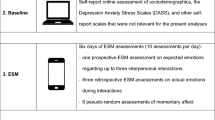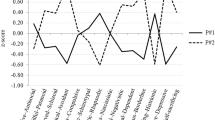Abstract
The purpose of the present study was to examine the effect of cognitive demand on interpersonal sensitivity in initial interactions between unacquainted subjects. It was hypothesized that the increased cognitive demand created by initiating an unfavorable (vs. favorable) impression would lead to decreased accuracy in inferences made about an interaction partner. Forty-six pairs of subjects were run in a 2 (favorable or unfavorable impression) × 2 (male dyad or female dyad) factorial design. One member of each subject pair was randomly assigned the perceiver role and given the impression-management instructions. When the interaction was finished, subjects rated themselves and their partner on seven dimensions (e.g., comfortable, friendly, dominant, etc.). Subjects also rated how they thought their partners perceived them on these same dimensions. Two accuracy scores were determined within pairs by correlating: (a) the perceiver’s ratings of the target with the target’s rating of self (direct perspective), and (b) the perceiver’s rating of “my partner thought I felt” with the target’s rating of the perceiver (meta-perspective). The hypothesis was supported in that favorable impression perceivers were significantly more accurate on the meta-perspective judgments than were the unfavorable impression perceivers. In addition, the favorable impression perceivers recalled more descriptive characteristics of the targets than did the unfavorable impression perceivers. The results of the study indicate that a more difficult, impression-management task reduced accuracy in interpersonal perception.
Similar content being viewed by others
References
Baumeister, R.F., Hutton, D.G., & Tice, D.M. (1989). Cognitive processes during deliberate self-presentation: How self-presenters alter and misinterpret the behavior of their interaction partners.Journal of Experimental Social Psychology, 25, 1 59–78.
Cronbach, L.J. (1955). Processes affecting scores on “understanding of others” and “assumed similarity.”Psychological Bulletin, 52, 177–193.
Cronbach, L.J. (1958). Proposals leading to analytic treatment of social perception scores. In R. Tagiuri & L. Petrullo (Eds.),Person perception and interpersonal behavior (pp. 353–379). Stanford, CA: Stanford University Press.
Gilbert, D.T., & Krull, D.S. (1988). Seeing less and knowing more: The benefits of perceptual ignorance.Journal of Personality and Social Psychology, 54, 193–202.
Gilbert, D.T., Krull, D.S., & Pelham, B.W. (1988). Of thoughts unspoken: Social influence and the self-regulation of behavior.Journal of Personality and Social Psychology, 55, 685–694.
Gilbert, D.T., & Osborne, R.E. (1989). Thinking backward: Some curable and incurable consequences of cognitive busyness.Journal of Personality and Social Psychology, 57, 940–949.
Gilbert, D.T., Pelham, B.W., & Krull, D.S. (1988). On cognitive busyness: When person perceivers meet persons perceived.Journal of Personality and Social Psychology, 54, 733–740.
Leary, M.R. (1983).Understanding social anxiety: Social, personality, and clinical perspectives. Beverly Hills, CA: Sage.
Quattrone, G.A. (1982). Overattribution and unit formation: When behavior engulfs the person.Journal of Personality and Social Psychology, 42, 593–607.
Snodgrass, S.E. (1985). Women’s intuition: The effect of subordinate role on interpersonal sensitivity.Journal of Personality and Social Psychology, 49, 146–155.
Swann, W.B., Jr. (1984). Quest for accuracy in person perception: A matter of pragmatics.Psychological Review, 91, 457–477.
Trope, Y. (1986). Identification and inferential processes in dispositional attribution.Psychological Review, 93, 239–257.
Wyer, R.S., Jr. & Srull, T.K. (1986). Human cognition in its social context.Psychological Review, 93, 322–359.
Author information
Authors and Affiliations
Rights and permissions
About this article
Cite this article
Patterson, M.L., Churchill, M.E., Farag, F. et al. Impression management, cognitive demand, and interpersonal sensitivity. Current Psychology 10, 263–271 (1991). https://doi.org/10.1007/BF02686898
Issue Date:
DOI: https://doi.org/10.1007/BF02686898




